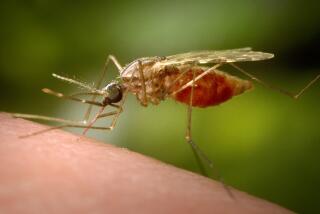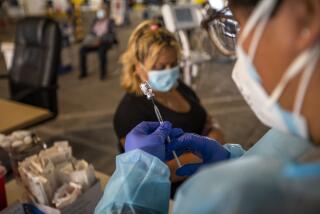Test Vaccine for Skin Cancer Extends Life Span, Study Says
- Share via
Patients with the deadliest form of skin cancer lived dramatically longer when they were injected with a vaccine-like treatment for the disease, according to a study released Thursday by a Santa Monica institute.
The experimental vaccine is among several being developed, which are aimed at curing patients whose malignant melanoma has spread despite surgery to remove cancerous moles and affected lymph nodes.
It will be five to 10 years before a government-approved vaccine is on the market and widely available, said the study’s author, Dr. Donald L. Morton, medical director of the John Wayne Cancer Institute at St. John’s Hospital in Santa Monica.
Traditional vaccines stimulate the body’s immune system to prevent a disease. Melanoma vaccines also are designed to trigger an immune system response, but they treat, rather than prevent, skin cancer.
Morton said his vaccine is further along in testing than others as a treatment for people with the most advanced stage of melanoma. He gave the vaccine to 136 such patients, then compared their longevity to that of 1,200 advanced melanoma patients treated conventionally in the last 20 years.
Of those who received the vaccine, 26% survived at least five years, more than four times the 6% five-year survival rate for the other patients.
Patients who received the vaccine lived an average of 23 months after diagnosis, more than three times longer than the average of 7.3 months for other patients. Morton said some patients have been followed for six to eight years and remain cancer-free.
Morton is scheduled to present his findings next week in Stockholm during a symposium organized by the foundation that awards Nobel prizes.
“This is a step in the direction of increasing the life span of patients who are quite ill with the disease,” said Ralph Reisfeld, a Scripps Research Institute biologist and biochemist who reviewed Morton’s work for the government.
“The eventual goal, of course, is a cure,” Reisfeld said. “But it’s a big thing if you can increase the life span of a patient.”
Morton’s findings “are very encouraging,” said Dr. Philip Livingston, who is developing another melanoma vaccine at Memorial Sloan-Kettering Cancer Center in New York.
But Livingston said to establish the vaccine’s benefits, Morton should study two groups of patients simultaneously treated with and without the vaccine. Morton said he plans to do that within two years.






